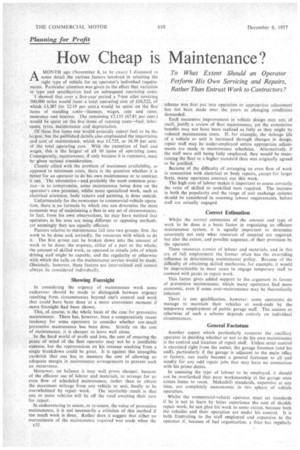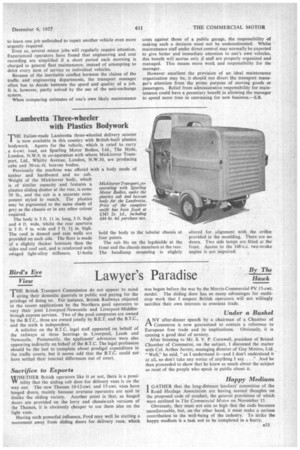Planning for Profit
Page 76

Page 83

If you've noticed an error in this article please click here to report it so we can fix it.
How Cheap is Maintenance?
AMONTH ago (November 8, to be exact) I discussed in some detail the various factors involved in selecting the right type of vehicle for an operator's individual requirements. Particular attention was given to the effect that variation in type and Specification had on subsequent operating costs.
showed that over a five-year period a 7-ton oiler covering 200,000 miles would incur a total operating cost of £10,522, of which £3,387 (or 32.19 per cent.). would be spent on the five items of standing costs—licences, wages, rent and rates. insurance and interest. The remaining £7.135 (67.81 per cent.) would be spent on the five items of running costs—fuel, lubri• cants, tyres, maintenance and depreciation.
Of these five hems one would naturally expect fuel to be thr largest, but the published details also emphasized the importance and cost of maintenance, which was £1,725. or 16.39 per cent. of the total operating cost. With the exception of fuel and wages, this is the largest of all 10 items of operating costs. Consequently, maintenance, if only because it is expensive, must be given serious consideration.
Closely allied with the problem of maximum availability, as opposed to minimum costs, there is the question whether it is better for an operator to do his own maintenance or to contract it out. The alternative—and probably the most common prac. lice—is to compromise, some maintenance being done on the operator's own-premises, whilst more specialized work, such as electrical attention, body repairs and painting, is done outside.
Unfortunately for the newcomer to commercial-vehicle operation, there is no formula by which one can determine the most economic way of maintaining a fleet in any set of circumstances. In fact, from his own observations, he may have noticed that operators in his area are using different or opposing methods. yet seemingly they are equally efficient.
Factors relative to maintenance fall into two groups: first, the work to be done and, secondly, the resources with which to do it. The first group can be broken down into the amount of work to be done; the urgency, either of a part or the whole; the amount of skilled work, as opposed to simple jobs of which driving staff might be capable, and the regularity or otherwise with which the calls on the maintenance service would be made. Obviously, however, these factors are intee-related and cannot always be considered 'individually.
Showing Foresight
In considering the urgency of maintenance work some endeavour should be made to distinguish between urgency resulting from circumstances beyond one's control and work that could have been done at a more convenient moment if more foresight had been shown. • This, of course, is the whole basis of the case for preventive maintenance. There has, however, been a comparatively recent tendency for some operators to consider whether too much preventive maintenance has been done. Strictly on the cost of maintenance, it is cheaper to leave well alone.
In the hard world of profit and loss, the cost of ensuring the peace of mind of the fleet operator may not be a justifiable expense, but the repercussions on his revenue resulting from a single breakdown could be great. It is against this intangible yardstick that one has to measure the cost of allowing an adequate margin in maintenance arrangements to prevent such an occurrence.
Moreover, on balance it may well prove cheaper, because of the efficient use of labour and materials, to arrange for an even flow of scheduled maintenance, rather than to obtain the maximum mileage from any vehicle or unit, finally to be overwhelmed by repair work. The inevitable result is that one or more vehicles will be off the road awaiting their turn for .repair.
In endeavouring to assess, or re-assess, the value of preventive maintenance, it is not necessarily a criticism of this method if too much work is done. Rather does it suggest that either an overestimate of the maintenance required was made when the EP scheme was first put into operation or appropriate adjustment has not been made over the years as changing conditions demanded.
Each successive improvement in vehicle design may not,' of itself, justify a review, of fleet maintenance, yet the cumulative benefits may not have been realized as fully as they might by reduced maintenance costs. If, for example, the mileage life of a vehicle or unit is increased through changes in design, repair staff may be under-employed unless appropriate adjustments are made in maintenance schedules. Alternatively, if the staff were still being fully employed, they would be maintaining the fleet to a higher standard than was originally agreed to be justified.
Because of the difficulty of arranging an even flow of work in connection with electrical or body repairs, except for larger fleets, many operators contract out this work.
The high cost of labour makes it important to assess correctly the ratio of skilled to unskilled men required. The increase in both the popularity and the range of unit exchange systems should be considered in assessing labour requirements. before staff are actually engaged.
Correct Estimation
Whilst the correct estimation of the amount and type of work to be done is a basic factor in organizing an efficient maintenance system, it is equally important to determine accurately not only what resources of material are required. hut also the extent, and possible sequence, of their provision by the operator.
These resources consist of labour and materials, and in this era of full employment the former often has the overriding influence in determining maintenance policy. Because of the difficulty of obtaining skilled mechanics, for example, it would he impracticable in most cases to engage temporary staff to contend with peaks in repair work.
This factor gives added support to the. argument in favour of preventive maintenance, which many operators find more economic, even if some over-maintenance may be theoretically inherent.
There is one qualification, however: some operators do manage to maintain their vehicles at week-ends by the temporary employment of public garage staff. The success or otherwise of such a scheme depends entirely on individual circumstances.
General Factotum
Another aspect which particularly concerns the, ancillary operator in deciding whether or not to do his own maintenance is the control and location of repair staff. Unless strict control is exercised right from the outset, the garage foreman (and his staff), particularly if the garage is adjacent to the main office or factory, can easily become a general factotum to all 'and sundry for any odd repair jobs that may have no connection with his prime duties.
In assessing the type of labour to be employed, it should not be overlooked that poor workmanship in the garage soon comes home to roost. Makeshift standards, expensive at any time, are completely uneconomic in this sphere of vehicle operation.
Whilst the commercial-vehicle operator must set standards if he is not to learn by bitter experience the cost of shoddy repair work, he can plan his-work to some extent, because both the vehicles and their operation are under his control. It is both frustrating to the staff employed and expensive to the operator if, because of bad organization, a fitter has reaularly to leave one job unfinished to repair another vehicle even more urgently required.
Even so, several minor jobs will regularly require attention. Experienced operators have found that engineering and cost recording arc simplified if a short period each morning is charged to general fleet maintenance, instead of attempting to debit every item of service to individual vehicles.
Because of the inevitable conflict between the claims of the traffic and engineering departments, the transport manager often has to decide between the speed and quality of a job. It is, however, partly solved by the use of the unit-exchange system.
When comparing estimates of one's own likely maintenance
costs against those of a public garage, the responsibility of making such a decision must not be underestimated. Whilst maintenance staff under direct control may normally be expected to give better and immediate attention to one's own vehicles, this benefit will accrue only a staff are properly organized and managed. This means more work and responsibility for the manager.
However excellent the provision of an ideal maintenance organization may be, it should not divert the transport manager's attention from the prime purpose of moving goods or passengers. Relief from administrative responsibility for maintenance could have a pecuniary benefit in allowing the manager to spend more time in canvassing for new business.—S.B.
























































































































